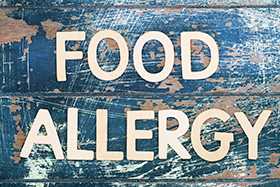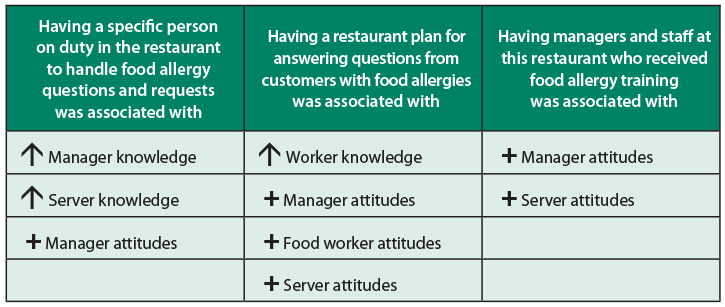Food Allergies: Knowledge and Attitudes of Restaurant Managers and Staff
This page shows the study purpose, method, results, conclusions, and recommendations in plain language for the EHS-Net project titled Food Allergens Study.
The findings and recommendations from this project are also in fact sheet format [PDF - 138 KB].
Citations for more EHS-Net publications are available by Study Topic or by Citation.

Key Findings & Recommendations
In general, managers, food workers, and servers were familiar with food allergies and had positive attitudes about accommodating customers with food allergies. However, we found important gaps. Some restaurant staff:
- Thought that their restaurant might not be able to respond to a food allergy emergency.
- Incorrectly believed that customers with food allergies could safely eat a small amount of the food they are allergic to.
We recommend restaurants implement three key restaurant practices linked with better food allergy knowledge and more positive attitudes about accommodating customers with food allergies. These practices are
- Having a plan for answering questions from customers with food allergies.
- Choosing a specific person in the restaurant to handle food allergy questions and requests.
- Training staff on food allergies.
Improving knowledge and attitudes of restaurant management and staff can ensure that all customers have a safe dining experience.
Study Problem
Food allergies are a growing food safety issue:
- 1 in 13 children have food allergies.
- 1 in 25 adults have food allergies.
Dining out can be difficult for people with food allergies because they must rely on restaurant staff to properly prepare their allergen-free meals. A survey of people with food allergies found that one in three had a reaction in a restaurant.
Understanding manager, food worker, and server knowledge and attitudes about food allergies can help us identify practices to reduce the risk of food allergic reactions in restaurants.
Study Purpose
The purpose of this study was to
- Describe knowledge and attitudes of restaurant managers, food workers, and servers about food allergies.
- Identify factors linked with their knowledge and attitudes.
Study Method
Participants
EHS-Net environmental health specialists collected data in about 50 randomly selected restaurants in each of the EHS-Net sites (California, Minnesota, New York State, New York City, Rhode Island, and Tennessee).
Data Collection
Data were collected in 278 restaurants. In each restaurant, data collectors interviewed a manager, observed the restaurant’s practices, and reviewed its menu. In three of four restaurants, data collectors also interviewed a food worker; in about half of restaurants they also interviewed a server.
Study Results
Managers and staff were generally knowledgeable about food allergies. Nearly all restaurant staff knew the symptoms of an allergic reaction and knew to call 911 in these situations. But more than one in ten managers and staff incorrectly believed that someone with a food allergy could safely eat a small amount of that allergen.
Overall, managers and staff had positive attitudes about accommodating customers with food allergies. Most felt it was important for food workers and servers to know about food allergies and that their restaurant could easily meet special requests of customers with food allergies. However, managers and staff had lower confidence in their restaurant’s ability to properly respond to a food allergy emergency.
Several restaurant practices were consistently associated with managers, food workers, and servers having better food allergy knowledge and more positive attitudes about accommodating customers with food allergies.

Study Conclusions
Restaurant managers and staff were generally knowledgeable and had positive attitudes about accommodating customers with food allergies. However we identified important gaps. Some restaurant staff:
- Incorrectly believed that customers with food allergies could safely eat a small amount of the food they are allergic to.
- Were concerned about their restaurant’s ability to deal with a food allergy emergency.
Several restaurant practices were consistently associated with better food allergy knowledge and more positive attitudes of restaurant managers and staff:
- Having a specific person on duty to answer food allergy questions and requests.
- Having a plan for answering questions from customers with food allergies.
- Training staff on food allergies.
Key Terms
- Environmental health specialists: public health workers who enforce health and safety standards related to food and other consumer products.
- Food allergy: an immune system response that occurs soon after eating a certain food. A reaction can be severe and life threatening.
- Page last reviewed: August 17, 2016
- Page last updated: April 18, 2017
- Content source:


 ShareCompartir
ShareCompartir